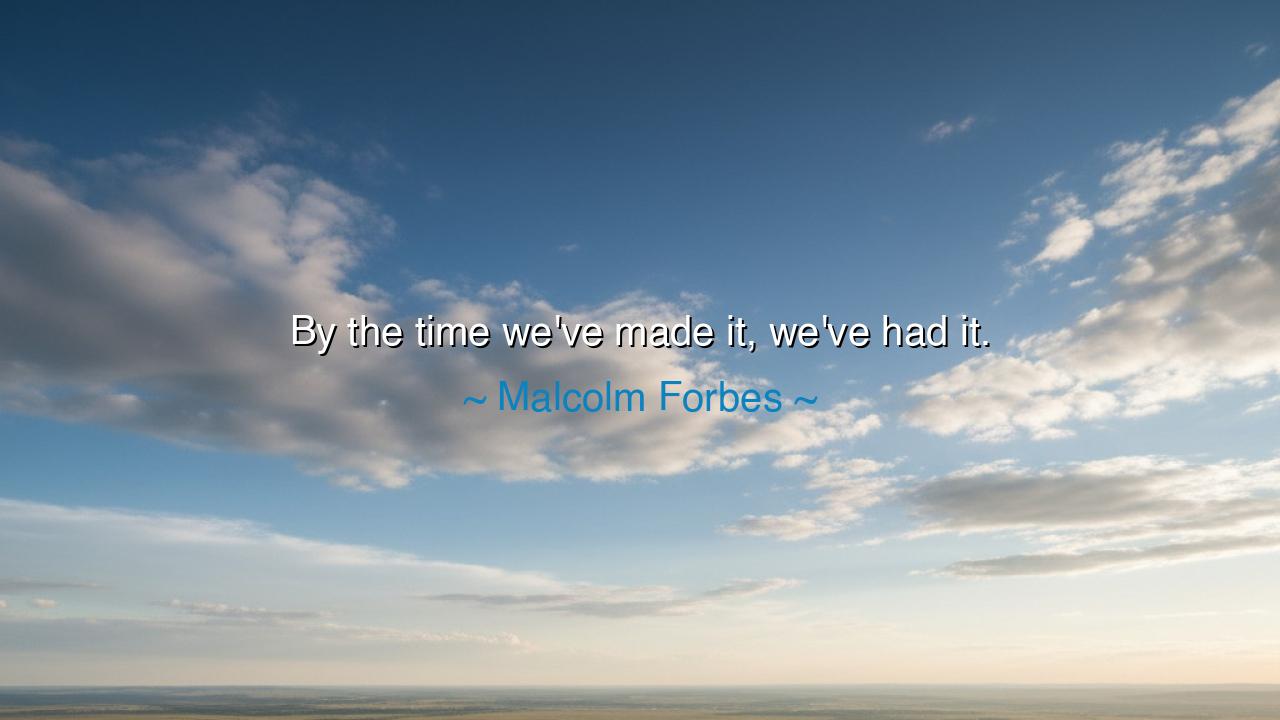
By the time we've made it, we've had it.






The publisher and voice of wealth’s ironies, Malcolm Forbes, once spoke a line both witty and grave: “By the time we’ve made it, we’ve had it.” In this paradox lies a sobering truth about the fleeting nature of ambition and the passage of life. Many strive endlessly toward some imagined summit—of success, of riches, of recognition—only to discover upon arrival that the vigor of youth has faded, that the energy to enjoy the prize has been consumed in the pursuit. Thus Forbes warns us: achievement without balance is hollow, for what good is victory if it arrives when the heart is too weary to rejoice in it?
The origin of this quote comes from Forbes’s reflections on business, ambition, and the often-devouring pursuit of success. He knew well the world of wealth and power, having built his life upon publishing and finance, and yet he saw the irony that too many discover: that life spent entirely in striving leaves little time for living. His words serve as both confession and counsel, a reminder that success is not a destination, but a journey meant to be savored.
The ancients also spoke of this wisdom. Solon of Athens once declared, “Count no man happy until his end is known,” warning that the pursuit of fortune is often deceptive. Ecclesiastes in the Hebrew scriptures laments that a man labors all his days, yet what profit has he, when time itself consumes him? In Rome, Horace urged his listeners to seize the day (carpe diem), for delay in pursuit of joy leaves only ashes when life has passed. Forbes’s phrase echoes these timeless voices: by the time many think they have “made it,” they have already spent the best of their years.
History itself offers poignant examples. Consider the tale of Howard Hughes, who amassed unimaginable wealth and power, yet spent his final years in fear, frailty, and isolation. He “made it” by the measure of fortune, but by then he had already “had it,” for health, joy, and peace had fled from him. Contrast this with Leonardo da Vinci, who, though never fully satisfied with his achievements, lived a life of constant curiosity, finding joy in the act of discovery rather than the finality of having “made it.” In one, ambition consumed life; in the other, the journey itself became life’s reward.
The meaning of Forbes’s words is deeply practical: do not defer living until some imagined success is reached. Success delayed is often success denied, for time does not wait. To say, “I will live when I am rich, when I am recognized, when I have finally made it,” is to build a house upon sand. By the time that house is complete, the storm of life may already have passed. Instead, wisdom is to weave joy into the labor itself, to savor moments along the way, and to measure success not only by what is gained, but by how one lives while gaining it.
Therefore, the lesson is this: do not let ambition steal from you the present. Strive, yes, but also pause. Work, but also live. Celebrate small victories, cherish relationships, and take rest. Wealth and recognition may come, but health, youth, and time will not return once gone. It is better to live richly while building than to build greatly only to find oneself too spent to live.
In practice, I counsel this: each day, ask not only, “What am I achieving?” but also, “What am I living?” If your entire life is consumed by tomorrow’s goals, you risk awakening too late. Make space for joy, for love, for reflection. Find success in the moment, not just the destination. Let ambition serve life, not devour it.
Thus, hear the wisdom of Malcolm Forbes: “By the time we’ve made it, we’ve had it.” Let it not be a lament over wasted years, but a warning that stirs you to balance ambition with presence. Strive, but also live. Build, but also rejoice. For the true measure of success is not only what you gain, but whether, in gaining it, you have truly lived.






AAdministratorAdministrator
Welcome, honored guests. Please leave a comment, we will respond soon